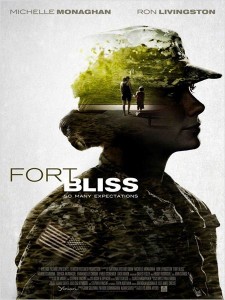Often hitting the expected notes, coming home movies have become very familiar by this point. Writer-director Claudia Myers‘ Fort Bliss, however, stands apart in a few ways. Following a mother, played by Michelle Monaghan, the story tells of her return home as she has trouble picking up where she left off with her child.
It’s the kind of role Monaghan thrives in as the actress’ best work is generally seen in dramas such as Trucker, Gone Baby Gone, and North Country. Her charm and range is also put to great use in more of the audience-friendly features she’s appeared in, ranging from Kiss Kiss, Bang Bang to Source Code to Mission: Impossible III. Coming off True Detective and Fort Bliss, we recently had the opportunity to speak with Ms. Monaghan. Here’s what she had to say:
When it comes to the demands of a film and television series, are they wildly different jobs?
It really depends. True Detective was six months, so it was essentially shooting a long movie. With Fort Bliss we shot it in 21 days, which is a remarkable schedule. We were living it, eating it, and breathing it. It has benefits, but also not great benefits [Laughs]. With this kind of material, though, I think it served us.
As someone with an investigative journalism background, is it a highlight of the job researching the worlds of True Detective and Fort Bliss?
One of the great benefits of the job is putting myself in someone else’s shoes for a moment, to convey a perspective I would never have or other people don’t get to see. I consider that a privilege. This is a movie about a female vet, and their stories are almost absent from our cultures. It was something I took very seriously. I went down to Fort Bliss, in addition to a medic training course, and I had the privilege of spending time with some female vets. They were very candid with me about sharing their experiences and their stories. I appreciated that, because those experiences became invaluable with the character and what I wanted to convey on screen.
I imagine they just don’t open up to anyone, so it must’ve been gratifying.
I think so. I really wanted to share how much care I had in representing them. I wanted them to know it was something I took very seriously. When they understood I was sincere in asking the right questions, they became very forthcoming and honest.
If you don’t mind asking, what kind of questions did you ask?
I wanted to just understand what their challenges were as moms. A very simple question garnered a very profound answer, which was, “How has it been coming home?” One vet said it was harder than going to war. You know, that’s revelatory. It’s so defining for a character. If someone can say that, that’s a big statement to make. That immediately puts you in their shoes. This story may seem unique to civilians, but it’s a common experience for women in the military.
I know you didn’t produce this, but are stories like Fort Bliss and Trucker [executive-produced by Monaghan] the kind that get you interested in working behind-the-scenes?
Yes. I could never imagine myself directing, but I think producing is more up my alley. I’d have a lot to learn as a director. I am not a filmmaker. I enjoy my job as an actor and bringing people together. I don’t think I would be right behind the camera.
As a producer, is it tough finding material you get passionate about?
It is. It’s hard finding material that’s really good. In this respect, it’s a story where everyone makes sacrifices. I love that this film lives in a grey area. These are people who are doing the very best that they can in an imperfect world. I think that’s profound, grounded, and based in reality. I’m inspired by those stories, and it’s a testament to Claudia Myers’ writing and directing. Those are the roles I can sink my teeth into: complex, flawed, vulnerable, strong, nurturing, and all these different aspects. Sometimes those qualities are in movies made for between one to five million dollars, and those are the toughest movies to get made because they’re not tied up in a neat little bow. Sometimes that can be a struggle, but it’s something I’m passionate about.
Growing up, were those the kinds of films you were interested in making?
You know, it’s interesting, because I didn’t really grow up watching movies. I grew up in a very rural part of the midwest with 700 people. Movies weren’t really a big aspect of my life. I started dating when I was 17, so that’s when I started to go to the movies every now and then. There wasn’t independent films around [for me to see]. I think why I really like making movies that could be the family or woman next door is because that’s what my roots were.
Before you go, since it’s one of my favorite movies, I have to ask: if Kiss Kiss, Bang Bang is on television, will you watch it?
You know what? If I caught it on TV I probably would watch it. I actually haven’t seen the movie since it premiered however many years ago. I keep telling myself I want to go back and rewatch it, but I never really rewatch movies I’m in. I don’t know why. Sometimes I’ll catch some of them on television. The only one I ever seem to catch on TV is Eagle Eye [laughs], so sometimes I’ll see a few minutes of that. Kiss Kiss, Bang Bang really is one of the movies I’m most proud of. It was such an amazing experience. Without that role, I wouldn’t have the career that I have now.
Fort Bliss is now in limited release and available on VOD.


